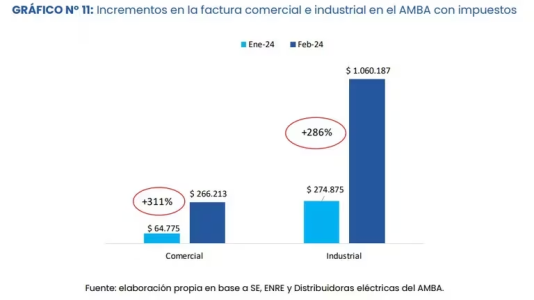Electricity: with increases of up to 300%, businesses and SMEs warn of the transfer of prices to the consumer - Infobae

Source:

Electricidad: con subas de hasta 300%, comercios y pymes advierten por el traslado de los precios al consumidor
En el sector empresario hay preocupación por la caída en las ventas ante la pérdida del poder adquitivo de los ingresos. Temor por cierres y despidos
February 23, 2024
In the business sector there is concern about the drop in sales due to the loss of purchasing power of income. Fear of closures and layoffs
By Agustín Maza

Greater price increases are expected, amid the sharp drop in consumption. EFE/ Enrique García Medina
In the coming weeks, electricity bills corresponding to February will reach small businesses and industrial SMEs with up to 300% increases compared to what they had paid in January. Entrepreneurs in that segment warn that this will imply a transfer to shelf prices, amid a sharp drop in sales due to the impact of the loss of purchasing power of income and the effects of the ongoing recession.
The vice president of the National Confederation of Storekeepers, Fernando Savore , stated that any type of increase in electricity is an increase in its operating cost and, therefore, affects the sales price. That equation jumped from 17% to 19% in the last six months. For consumers' pockets, that's more inflation .
Merchants point out that this increase in operating costs occurs in the midst of a sharp drop in consumption . “In January we had estimated a 40% drop in sales for Buenos Aires, because it is usually a period in which many people go on vacation. In the end it was 15% but many people stayed; February we come with a drop of 25% and March is going to be bad because there is a lot of spending for the start of classes, the return of vacations and inflation,” Savore explained.

Industrial SMEs warn of the drop in production in January and the effect of the recession. EFE/ Juan Ignacio Roncoroni
The president of the Argentine Industrial Pymes (IPA) association, Daniel Rosato, warned that due to the impact of the increases, shelf prices could reach 30 percent . “It will cause a vicious circle, which will result in a drop in consumption, loss of jobs, inflation and destruction of factories,” he said.
In this sense, Rosato detailed the jump in electricity for companies and the transfer that will be seen in the marketing of products because “in the January bill there was an increase of 40% in the Wholesale Electricity Market (MEM), established by Cammesa. To that we must add increases in February and April, which will accumulate 314% for the industry, which will mean a 30% increase in shelves."
The Interdisciplinary Institute of Political Economy (IIEP ) of UBA-Conicet published a report in which they calculated the increase that small businesses and industrial SMEs in the Metropolitan Area of Buenos Aires (AMBA) will receive in their bills . The simulations showed the following increases:
- In the AMBA, a small business with a contracted power of 10 KW and a consumption of 1,200 kwh/month will go from paying a bill of $64,775 in January to $266,213 in February including taxes. This is an increase of 311% month-on-month
- On the other hand, a small industry with a contracted power of 35 KW and a monthly consumption of 6,500 kwh/month will go from paying a bill of $274,875 in January to $1,060,187 in February. This is an increase of 286% month-on-month.
The Government of Javier Milei is advancing in a “cleansing” of energy rates to reduce subsidies by 0.5% of GDP this year, as one of the keys to the fiscal surplus objective. A problem with the subsidies that the different administrations in charge of the Casa Rosada sought to organize but did not succeed.

Small businesses will have electricity increases of 311% and SME industries 285% compared to what they had paid the previous month. (iiep)
The rise in the wholesale price of energy after the devaluation , power charges and the increase in the cost of distribution. The IIEP shows that the recomposition in what these users will pay will be significant: “Under this analysis, in February 2024, businesses and industries will have an increase in their bills, including taxes, of 2,102% and 2,113% compared to February 2019 while that wholesale and retail prices would increase 1,920% and 1,689% respectively in the same period.”
The latest report presented by the Argentine Confederation of Medium Enterprises (CAME) is devastating. January retail sales fell, year-on-year, by 28.5%. If compared to the last month of last year, the reduction was 6.4% seasonally adjusted.
The CAME survey showed that consumers adjusted and made more careful purchases, prioritizing the urgent. For most traders, January was a lost month. From the entity they stated: "Inflation causes SMEs to lose profitability and low demand finds small and medium-sized companies in a very weak economic and financial situation."
Although there was a drop in all areas, Food and Beverages was one of those that decreased the most and contracted 37.1%. Inflation was 20%, after 25.5% in December.


